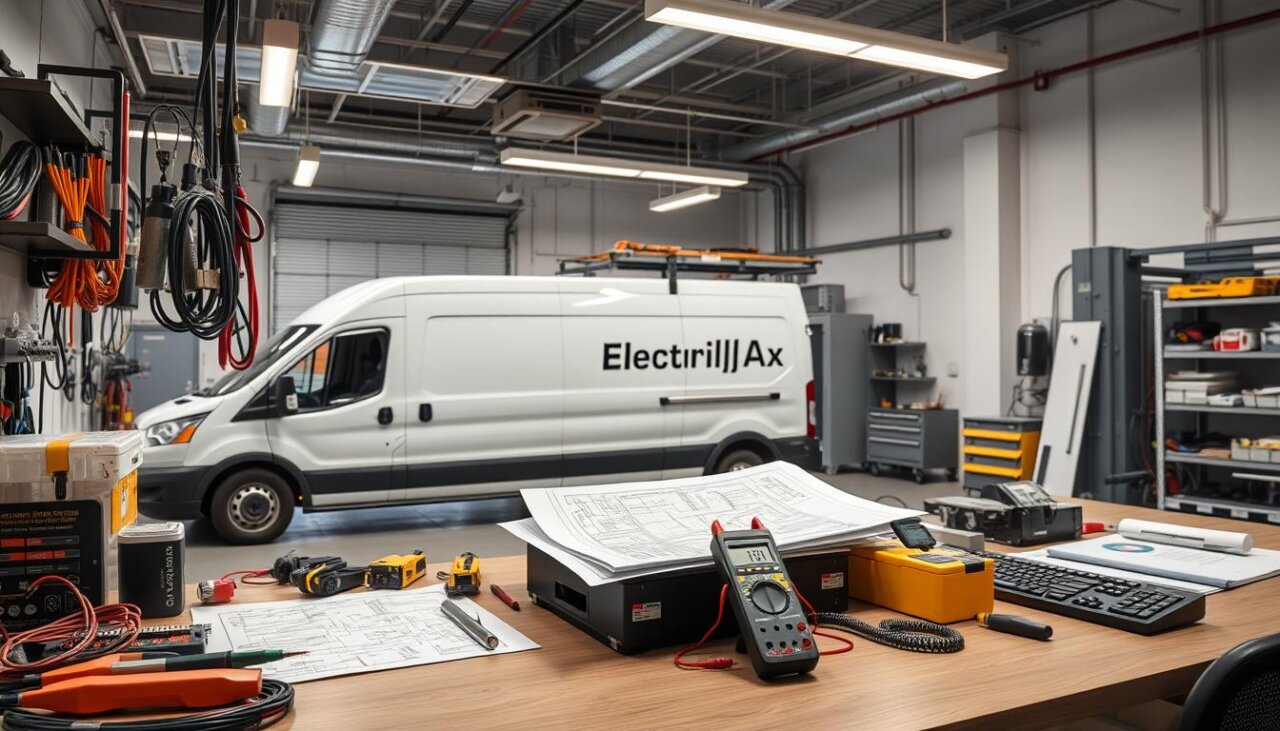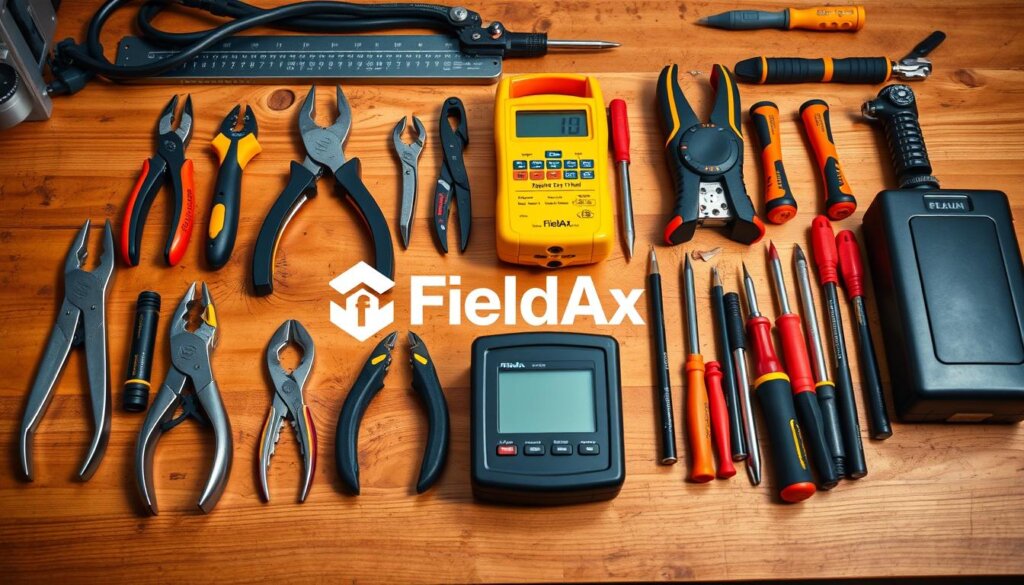Starting my own electrician business was a big step for me. I remember my first day, full of excitement and a lot to learn. It was more than just fixing wires; it was about building a brand and earning trust.
Every day was a challenge, but also a chance to grow. Watching my business grow was incredibly rewarding.
Learning about the electrician business was key. I found out about the important steps to start. This included understanding the market, knowing the skills needed, and making a solid business plan.
Getting the right licenses and certifications was crucial. It was like making sure every project is safe and follows the rules.
But the excitement didn’t stop. I learned that having the right tools and managing electrical services well was vital. Building strong relationships with clients was also important for my business to thrive.

Key Takeaways
- Understand the electrician business landscape for better insights.
- Identify essential skills and knowledge needed for success.
- Create a comprehensive business plan tailored to your services.
- Navigate the licensing and certification process efficiently.
- Invest in quality tools and effective electrical service management strategies.
- Develop a strong marketing strategy to attract clients.
- Foster relationships with clients for long-term success.
Understanding the Electrician Business Landscape
The electrician industry is changing fast, thanks to new tech and what people want. More homes and businesses need electricians. This means more jobs for electricians.
Skills in smart homes, green energy, and automation are key. People with experience in robots and automation will do well. Jobs need both tech skills and the ability to learn new things.
The electrician world is also getting more competitive. Electricians must keep learning and getting certified. This helps them stay ahead in a changing market.
Essential Skills and Knowledge for Electricians
To excel in the electrician trade, you need a strong set of skills. Having solid technical skills is key for safe and efficient work. Hands-on experience is also vital, as it sharpens your abilities through real projects.
Electrician training is also crucial for growth. I look for courses that teach the newest technologies and methods. This keeps my skills up-to-date and ensures I follow all rules.
Knowing local electrical codes and safety rules is essential. It keeps me and my clients safe, building trust in my work. Being good with customers is just as important as technical skills. Positive relationships with clients help my reputation and success.
Creating a Business Plan
Creating a detailed business plan is key for my electrical services’ success. I will first outline the services I will offer. This could include work for homes, businesses, and industrial sites. Each area needs different skills and marketing plans.
Defining Your Services Offered
I aim to offer services that meet my clients’ needs well. My main services will be installing, maintaining, and fixing electrical systems. I might also offer energy audits or smart home setups. This could attract more customers and set my business apart.
Target Market Analysis
Understanding my target market is crucial. I will study who my customers are, who my competitors are, and what the community needs. This information will help shape my marketing strategies. It ensures my business plan fits the market’s needs.

Licensing and Certification Requirements
Starting an electrician business needs a good grasp of electrician licensing and electrical certification rules. These rules are key to building trust and following local laws. Each state has its own licenses, from general electrician to specialized ones.
First, I need to choose how my business will be set up. This choice affects the legal requirements I must meet. Getting an electrician license means finishing certain courses, passing tests, and sometimes getting experience under a supervisor.
For jobs needing special skills, I might need extra certifications like ASE T8. I have to get these within 18 months of starting work.
Certifications are very important. They make me more qualified and protect me and my business. About 10% of job ads in the field say you need licenses and certifications. Following local laws, being at least 21, and meeting education needs are also crucial. They help me serve my clients well and keep industry standards high.
Setting Up Your Business Structure
Choosing the right business structure is key when starting an electrician business. I need to understand the options, like a sole proprietorship and an LLC for electricians. This helps me decide on liability, funding, and what I’ll handle myself.
Sole Proprietorship vs. LLC
A sole proprietorship is easy to start. It means I can run my business without much paperwork and low costs. But, I’m personally responsible for all debts and legal issues.
An LLC for electricians gives me protection for my personal assets. It requires more paperwork and costs but is worth it for the benefits.
Tax Implications for Electricians
Taxes are different for each structure. As a sole proprietor, I report my business income on my personal taxes. This is simpler but might mean higher personal taxes.
With an LLC for electricians, I have choices. I can be taxed as a corporation or have pass-through taxation. This affects my taxes, so I need to think about it carefully.
Investing in Tools and Equipment
Starting my own electrician business means focusing on the right tools and equipment. I start with basic tools like pliers, screwdrivers, and wire strippers. Each tool has its own role, making my work easier and safer.
Then, I move to specialized gear like multimeters, circuit testers, and voltage detectors. These tools help me do complex jobs better. They show my dedication to quality in every electrical service.
Setting a budget helps me choose the best tools for my business. I look for reliable brands to ensure efficiency and durability. Spending on quality tools helps me meet customer needs and build a strong reputation.

Implementing Electrical Service Management
Streamlining operations is key for any electrician business. Using effective electrical service management boosts productivity and customer happiness. With tailored maintenance software, I can track work orders and manage assets better.
This digital tool helps me work more efficiently and accurately. It’s a game-changer for my business.
Using Maintenance Software for Efficient Operations
Maintenance software is essential for organizing daily tasks. It keeps all important info in one place, like licenses and insurance. This makes my workflow smoother and keeps me compliant.
It also helps me track maintenance schedules. Plus, data analysis leads to better business decisions.
Service Scheduling and Job Dispatching
Good service scheduling is crucial for quick responses and efficiency. Job dispatch for electricians helps me assign tasks wisely. This way, I use resources better and reduce downtime.
It also improves customer satisfaction. Being organized gives me an edge in the electrician business world.
Marketing Your Electrician Business
Effective marketing is key for my electrician business to grow. A good strategy for promoting electrical services helps me find new clients and build trust. Digital marketing is a big help, with a professional website and social media presence. This makes my business more visible in local areas.
Local ads are also very effective. Using community boards, local papers, and newsletters helps me reach people directly. Happy customers are important too, as they can tell others about my work.
Being active in my community boosts my credibility. Joining local events or workshops shows my skills. This builds trust with potential clients. Also, having a strong online presence that matches my local ads is crucial. It helps attract homeowners looking for reliable electricians.
Networking and Building Client Relationships
In the electrical services industry, networking for electricians is key to success. Connecting with others opens doors to referrals and partnerships. Building strong client relationships creates trust and reliability.
These relationships help get repeat business and lead to word of mouth referrals.
Going to local trade events and joining electrician groups can grow my network. Each meeting is a chance to learn and share. I can also find mentors who know the industry well.
Being active in my community strengthens client relationships. Happy clients often tell others about my services, helping my business grow. Keeping in touch with clients through follow-ups and feedback shows I care.
This approach makes clients feel valued, leading to lasting partnerships.
Conclusion
Starting an electrician business needs careful planning, skill building, and a focus on great service. This guide has given me the tools to tackle the challenges of being an electrician entrepreneur. I now know how to navigate the electrical industry and improve my skills to serve my clients well.
Success in electrical services isn’t just about being good with tools. Keeping up with new knowledge and trends is key. As I grow my business, learning and staying current will help me stay ahead. This means getting certifications, attending workshops, and gaining hands-on experience.
Running my business efficiently and professionally will also help me succeed. With a solid business plan and a commitment to quality, I’m ready to build a successful electrician business. My goal is to not only meet but exceed client expectations, building lasting relationships along the way.
See how FieldAx can transform your Field Operations.
Try it today! Book Demo
You are one click away from your customized FieldAx Demo!
FAQ
What are the key steps to starting my own electrician business?
To start your electrician business, first research the market. Then, get the skills you need. Next, write a detailed business plan.
After that, get the right licenses and certifications. Choose a business structure that works for you. Invest in the tools you’ll need.
Finally, manage your electrical services well. This will help you succeed.
How can I identify my target market in the electrician industry?
To find your target market, do a market analysis. This will show you who your customers are, what they need, and who your competitors are.
Understanding this will help you decide if you’ll serve homes, businesses, or industrial sites.
What licensing or certifications do I need to operate as an electrician?
Licensing and certification rules change by state. You’ll likely need a general electrician license. You might also need special certifications for certain jobs.
What are the advantages of setting up an LLC for my electrician business?
An LLC protects your personal stuff, offers tax flexibility, and looks good to clients. But, think about the hassle of setting one up.
What essential tools and equipment should I invest in?
As an electrician, you’ll need basic tools, multimeters, and circuit testers. You might also need special gear for certain jobs. Choose quality tools for safety and work efficiency.
How can maintenance software help my electrical service management?
Maintenance software helps manage work orders and assets. It makes scheduling and dispatching better. This means faster service and happier customers.
What marketing strategies are effective for attracting clients?
Good marketing includes digital ads, local ads, and word-of-mouth. A professional website and social media are key for attracting customers.
Why is networking important for my electrician business?
Networking is key for referrals, partnerships, and collaborations. Good relationships with others boost your reputation. This leads to more repeat business.
Author Bio
Co-Founder & CMO at Merfantz Technologies Pvt Ltd | Marketing Manager for FieldAx Field Service Software | Salesforce All-Star Ranger and Community Contributor | Salesforce Content Creation for Knowledge Sharing






